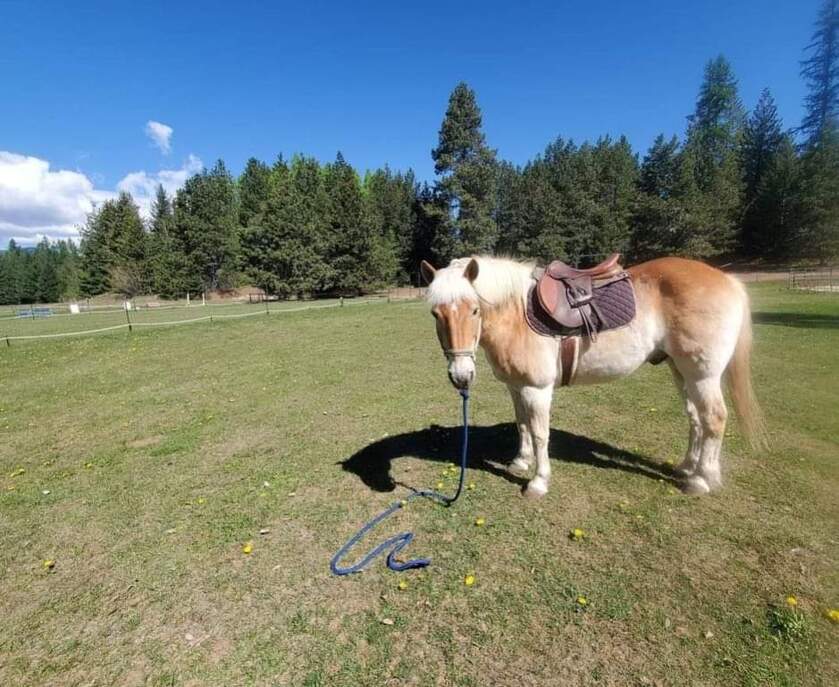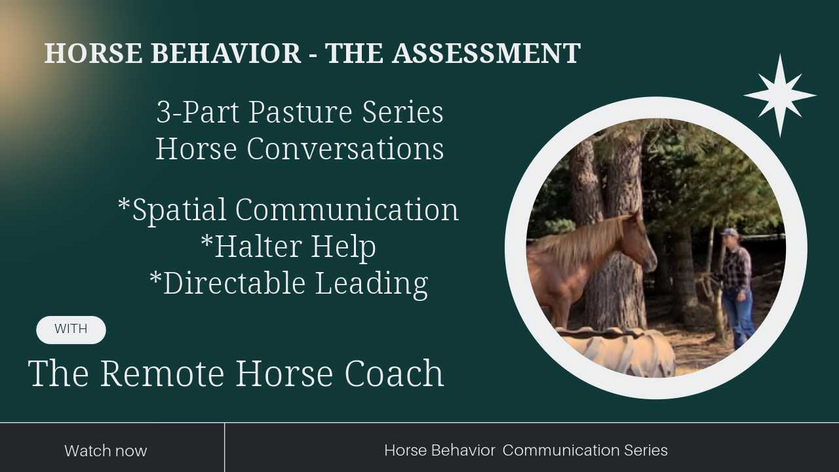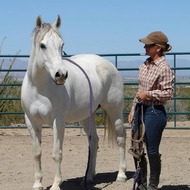
One of the greatest negative contributors in the horse industry (to both the human and horse) is the misperception of "Horse Training."
Factors like the owner's experience, perspectives, goals, understanding of horse behavior (or lack of it) despite however long they have been riding, influence what Horse Training means to them, versus what the horse experiences with the trainer.
For some, whose "world" is very small, much of the Training goals are about developing conditioned responses in the horse to create human convenience. This approach involves repetitiously presenting patterns and routines in the interaction to the point that the horse's mind frequently shuts down. His curiosity dissipates as he is grilled into becoming a non-resistant "broke" horse.
Others rely on the human-convenient 30, 60, or 90 days " Horse Training Program" under the guise that the horse can now do "anything." The horses are often bombarded and overwhelmed with with so much desensitizing, tasks, and stimulus, they start stuffing their emotions, get defensive, carry continuous tension despite their slow movements, and are unavailable to try, think, or adapt. All too often the unsuspecting owner gets them home, does something in a way the horse didn't expect, and all the pent up emotions coming pouring out in dramatic physical behaviors.
If owners are not actively communicating or working with the equine professional, most have no idea as to what is being "done" with their horse.
It is common for many "horse trainers" to use one approach or method when working with a variety of horses, irrelevant of if it is appropriate for the individual equine. The professional's inability or unwillingness to adapt to the horse's current maturity, mental state, and physically abilities (irrelevant of his age) leaves the equine often in an increasingly defensive state than when he first arrived.
Rarely do horse professionals have the skills, follow through, or desire to communicate clearly (or frequently) with the horse's owner to keep them informed as to how, what, and why certain things are taught and done with the horse. Owners bring home their horse with no idea as to how to interact with him, and then things fall apart because they are not presenting or doing things like the trainer did.
There's also the varying quality (or lack) of in the horse trainer's skills. Here in the US, anyone can hang a sign advertising as a trainer. I've encountered far too many "professionals" whose scope, experience, and ability to work with the horse is incredibly limited.
When most owners consider Training, they have a no understanding in what they should be asking, seeing, and communicating with a trainer BEFORE enrolling their horse in a program.
This leads to too many people getting their horse back from the trainer in a defensive, defeated state.
I wonder what the concept of "training" would be if people viewed every moment of Interaction with the Horse as both a teaching and learning moment for BOTH the human and horse.
What if there wasn't the illusion or sales pitch that training would create an obedient, submissive animal?
What if there was priority for the owner to invest time and effort into their own education and understanding along with that of the horse?
I won't even delve into the toxic, bullying, abusive relationship that often occurs between horse trainers and their clients. I have lost count of the calls from desperate horse owners who in their attempts to learn why the trainer is doing something extreme to the horse, experience defensive and hostile verbal attacks from the trainer as they attempt to defend harsh or severe training practices.
Please remember... you are your horse's voice.
This Friday's Dear Sam: Horse Help Horsemanship Series will share tips on what to look for in researching a potential trainer.
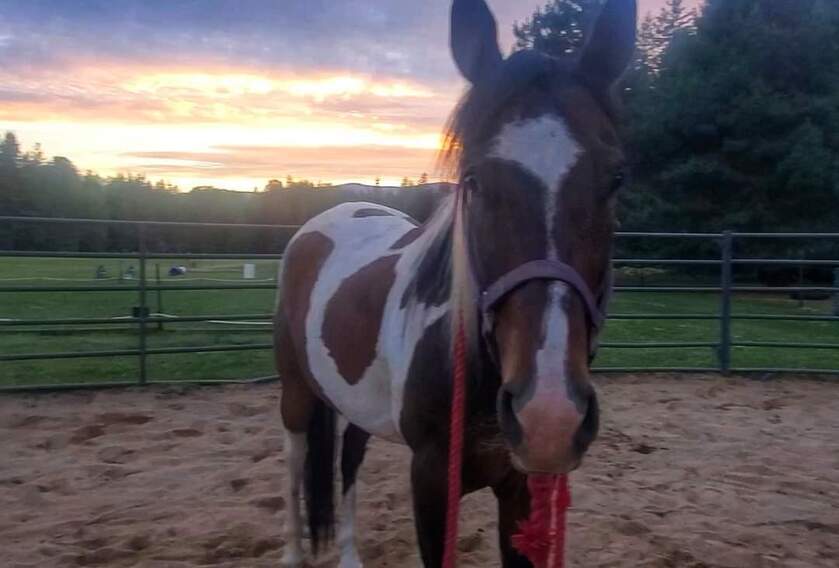
Equine Emergencies & Horse Evacuations
Please comment, like & share
Emergency Evacuation YouTube Video 1
https://youtu.be/52RflMZoP4w
Emergency Evacuation YouTube Video 2
https://youtu.be/jRCmOTq9mto
Horse Rider Communication
Common missing pieces
#alternativehorsemanship #RemoteHorseCoach #horses #horseriding #horserider #horsebackriding
*Defining & Refining Your Equine Search
*Deconstructing The Sales Ad
*Horse PreView Questions
*Learning to say "No" - 21 Common Scenarios
- 22 In-Person Tips & Tools
The must-have horse shopping guide that will help you clarify your goals, refine your search, recognize red flags, and build your confidence during your buying experience. The Remote Horse Coach shares insight from over 30 years of buying and selling horses.
"I've bought and sold many horses, and I couldn't believe how helpful this course was. Thank you!" Jillian, MI 2023
"I had ridden for years, but when it came time to purchase my first horse, the thought was daunting. I had heard plenty of horror stories and didn't want to make a mistake. I happen to find this course, and couldn't believe how it broke down the seemingly overwhelming idea of sifting through all the horse advertisements, to a plausible experience. It really worked- I finally found my horse of a lifetime. I'm forever grateful, thanks Sam!" Carolyn, MA 2023
Enroll...
Join Alternative Horsemanship™ the Remote Horse Coach as she shares unedited first session assessments of working with a 10-13 year old horse, breed unknown, past unknown. Offering voice-overs to explain how the real-time assessment occurs, what to look for in the horse's feedback, recognizing patterns, and much more.
Initial Assessment 3-part series focuses on
Spatial Awareness
Defensive Behaviors
Physical Triggers
https://remotehorsecoach.uscreen.io/orders/complete_order?o=187097
First Pasture Session - The 3-part series focuses on
Spatial Communication
Halter Help
Directable Leading
Bonus video- After the Session
https://remotehorsecoach.uscreen.io/orders/complete_order?o=187250
I often hear people talking about how it feels like they're guessing with their horse, they don't know where to start, or they don't know where/why things fall apart, creating unwanted equine behaviors.
The goal of this 2-part livestream is to help adjust the human perspective on how they observe the horse. Then to connect how their Observations can lead to developing Adaptable horse skills, to address the equine in both a real time and relevant manner.
Observation Opportunities
Sept 7th 9am pdt
Adaptable Interactions
Sept 14th 9am pdt
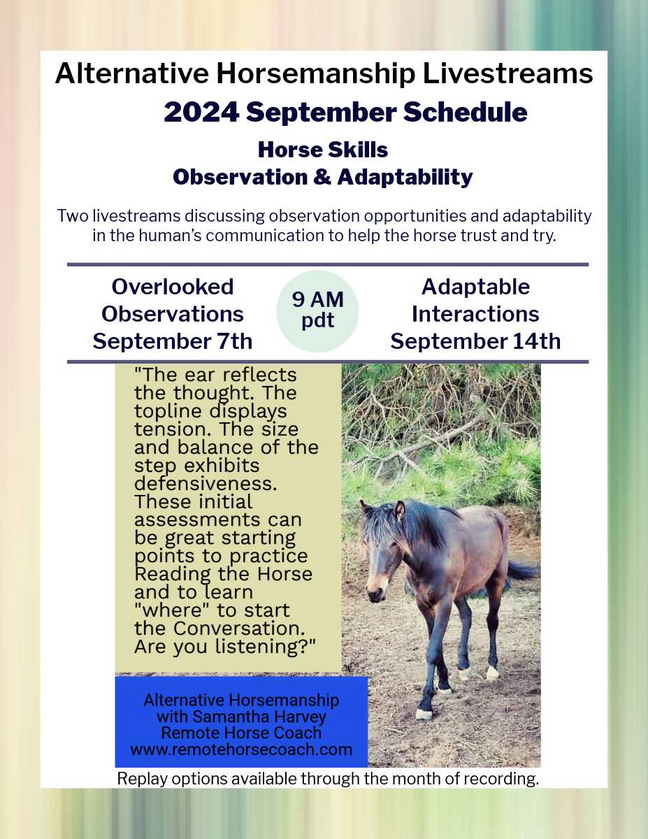
Below are some basic questions to ask in regards to your horse’s health.
I suggest keeping a horse health journal making note of diet changes, farrier care, odd behaviors, etc. It can be used as a future reference point to learn from and find what works best for the horse.
Taking pictures from both profiles, front, and rear every six months can also be a good reference.
For those who experience dramatic seasons and environmental changes and for those who have had the same horse(s) for a long time, patterns often occur out of convenience in the horse’s maintenance program.
As the horse gets older possible adjustments may need to be made to the program.
What is the general condition of your horse's mane and coat?
Weight-wise does your horse look consistent or does he look like he is carrying extra weight or pockets of fat, especially along his neck and hindquarters?
What does your horse's hoof condition look like?
Do you notice if there are changes or ridges on the outside of the hoof?
Have you taken pictures from ...
